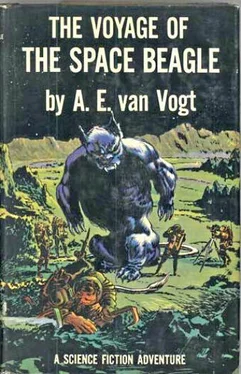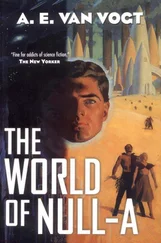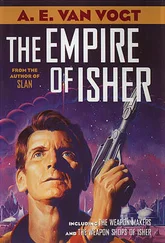When Korita had finished, Grosvenor said, “Perhaps their resentment of change is responsible for the attack on the ship?” The archaeologist was cautious. “Perhaps.” There was silence. It seemed to Grosvenor that he had to act as if Korita’s total analysis was correct. He had no other hypothesis. With such a theory as a starting point, he could try to obtain verification from one of the images.
A glance at the chronometer tensed him. He had less than seven hours to save the ship.
Hastily, he focused a beam of light through the encephalo-adjuster. With quick movements, he set a screen in front of the light, so that a small area of glass was thrown into shadow except for the intermittent light that played on it from the adjuster.
Instantly, an image appeared. It was one of the partially doubled ones, and because of the encephalo-adjuster, he was able to study it in safety. The first clear look astounded him. It was only vaguely humanoid. And yet it was understandable how his mind had leaped to the woman identification earlier. Its overlapping double face was crowned with a neat bun of golden feathers. But its head, though now unmistakably bird-like, did have a human appearance. There were no feathers on its face, which was covered with a lacework of what seemed to be veins. The human appearance resulted from the way those markings had formed into groups, to give the effect of cheeks and nose.
The second pair of eyes and the second mouth were in each case nearly two inches above the first. They almost made a second head, which was literally growing out of the first. There was also a second pair of shoulders, with a doubled pair of short arms that ended in beautifully delicate, amazingly long hands and fingers — and the overall effect was still feminine. Grosvenor found himself thinking that the arms and fingers of the two bodies would be likely to separate first. The second body would then be able to help support its weight. Parthenogenesis, Grosvenor thought. Reproduction without sex. The growth of a bud from a parent body, and the final separation from the parent into a new individual.
The image in the wall before him showed vestigial wings. Tufts of feathers were visible at the “wrists”. It wore a bright blue tunic over an astonishingly straight and superficially humanlike body. If there were other vestiges of a feathery past, they were hidden by the clothing. What was clear was that this bird didn’t, and couldn’t, fly under its own power.
Korita spoke first, in a helpless tone. “How are you going to let it know you’re willing to be hypnotized in exchange for information?”
Grosvenor did not answer in words. He stood up and tentatively drew a picture of the image and of himself on a blackboard. Forty-seven minutes and scores of drawings later the bird image suddenly faded from the wall, and a city scene appeared in its place.
It was not a large community, and his first view of it was from a high vantage point. He had an impression of very tall, very narrow buildings, clustered so close together that all the lower reaches must be lost in gloom for most of each day. Grosvenor wondered, in passing, if that might possibly reflect nocturnal habits in some primeval past. His mind leaped on. He ignored individual buildings in his desire to obtain a whole picture. Above everything else, he wanted to find out the extent of their machine culture, how they communicated, and if this was the city from which the attack on the ship was being launched.
He could see no machines, no aircraft, no cars. Nor was there anything corresponding to the interstellar-communication equipment used by human beings, which, on Earth, required stations spaced over many square miles of land. It seemed likely, therefore, that the origin of the attack was nothing like that.
Even as he made his negative discovery, the view changed. He was no longer on a hill but in a building near the centre of the city. Whatever was taking that perfect colour picture moved forward, and he looked down over the edge. His primary concern was with the whole scene. Yet he found himself wondering how they were showing it to him. The transition from one scene to another had been accomplished in the twinkling of an eye. Less than a minute had passed since his blackboard illustration had finally made known his desire for information.
That thought, like the others, was a flashing one. Even as he had it, he was gazing avidly down the side of the building. The space separating it from the near-by structures seemed no more than ten feet. But now he saw something that had not been visible from the hillside. The buildings were connected on every level by walks only inches wide. Along these moved the pedestrian traffic of the bird city.
Directly below Grosvenor, two individuals strode towards each other along the same narrow walk. They seemed unconcerned by the fact that it was a hundred feet or more to the ground. They passed casually, easily. Each swung his outside leg, wide around the other, caught the walk, bent his inside leg wide out, and then they were by, without having broken pace. There were other people on other levels going through the same intricate manoeuvres in the same nonchalant manner. Watching them, Grosvenor guessed that their bones were thin and hollow, and that they were lightly built.
The scene changed again, and then again. It moved from one section of the street to another. He saw, it seemed to him, every possible variation of the reproductive condition. Some were so far advanced that the legs and arms and most of the body was free. Others were as he had already seen them. In every instance, the parent seemed unaffected by the weight of the new body.
Grosvenor was trying to get a glimpse inside one of the dim interiors of a building when the picture began to fade from the wall. In a moment, the city had disappeared completely. In its place grew the double image. The image fingers pointed at the encephalo-adjuster. Its motion was unmistakable. It had fulfilled its part of the bargain. It was time for him to fulfill his.
It was naive of it to expect that he would do so. The trouble was, he had to. He had no alternative but to carry out his obligation.
“I am calm and relaxed,” said Grosvenor’s recorded voice. “My thoughts are clear. What I see is not necessarily related to what I am looking at. What I hear may be meaningless to the interpretive centres of my brain. But I have seen their city as they think it. Whether what I actually see and hear makes sense or nonsense, I remain calm, relaxed, and at ease….”
Grosvenor listened carefully to the words, and then turned to Korita. “That’s it,” he said simply.
The time might come, of course, when he would not consciously hear the message. But it would be there. Its patterns would impress ever more firmly on his mind. Still listening, he examined the adjuster for the last time. It was all as he wanted it.
To Korita, he explained, “I’m setting the automatic cutoff for five hours. If you pull this switch” — he indicated a red lever — “you can break me free before then. But only do so in an emergency.”
“How do you define emergency?”
“If we’re attacked here.” Grosvenor hesitated. He would have liked a series of breaks. But what he was about to do was not merely a scientific experiment. It was a life-and-death gamble. Ready for action, he put his hand on the control dial. And there he paused.
For this was the moment. Within a few seconds, the group mind of countless individual bird folk would be in possession of parts of his nervous system. They would undoubtedly try to control him as they were controlling the other men on the ship.
He was fairly positive that he would be up against a group of minds working together. He had seen no machines, not even a wheeled vehicle, that most primitive of mechanical devices. For a short time, he had taken it for granted that they were using television-type cameras. Now he guessed that he had seen the city through the eyes of individuals. With these things, telepathy was a sensory process as sharp as vision itself. The en-massed mind power of millions of bird people could hurdle light-years of distance. They didn’t need machines.
Читать дальше











